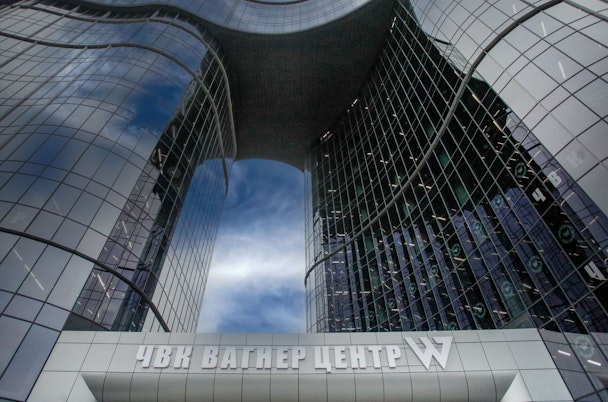Wagner has put marketing tactics on the front line
Marketing can change the world for the worse as well as the better. As The Drum's editor-in-chief Gordon Young writes, the devastating power of branding and communications cannot be underestimated.

Wagner's 'corporate' HQ in St. Petersburg, Russia / Adobe Stock
History has numerous examples of branding and communications being weaponized to leave a stain instead of a mark.
The latest example is Wagner Group PMC. It rose from the status of a rumor to become the world’s best-known mercenary army.
And the rise of the brand was no accident. It was part of a deliberate strategy to make it a more effective fighting machine.
Advertisement
Driving this transformation was Yevgeny Prigozhin, who has just (apparently) paid the price for what – in marketing parlance – might be described as an over-ambitious brand extension. But up until the ill-advised attack on Russia itself, the strategy was effective.
Candace Rondeaux, a politics professor at Arizona State University, gave this analysis for the liberal think tank New America earlier this year: “Prigozhin began to experiment with and evolve an online brand for Russia’s secretive irregular contract forces amid the world-changing churn of the Arab Spring and Euromaidan crisis in Ukraine.
“Known today the world over as the Wagner Group, Prigozhin’s slickly marketed brand-name paramilitary has generated an online following that has morphed into a Russian social movement millions strong, fueling the recruitment of contract fighters.
“The Wagner Group brand has brought in millions of dollars in donations and military gear, making it a critical source of Russia’s force mobilization in Ukraine and elsewhere around the world.“
The name Wagner comes from the military call sign of its alleged founder Dmitry Utkin. The former special forces commander was an admirer of Nazi Germany and took the name because the work of the composer had been appropriated by Hitler.
Advertisement
As the group came out of the shadows it was probably retained because it was deemed by the group to be cool and an authentic reflection of its values – bombastic, barbaric and deadly.
They also saw it as a not-so-subtle nod to a famous scene from the movie Apocalypse Now in which American soldiers slaughter villagers in a helicopter attack in Vietnam to the music of the composer.
Either way, the name cut through, particularly among the Russian ultra-nationalist population; even in an authoritarian country, anti-authority figures and populist messaging resonate.
This public support complicated Putin’s response to Prigozhin’s march on Moscow. And it may also complicate the aftermath of the commander’s apparent demise.
But of course, this was not the whole story. According to Rondeaux: “As its online presence expanded, the Wagner Group began to seem as much an experiment in branding as a critical source of manpower.“
Suggested newsletters for you
"In mid-2019, an odd series of short videos depicting desert patrols in Syria began appearing in the PMC Wagner-Military Review feed. The videos bore a semi-transparent watermark of a skull and crossbones insignia, with the words Reverse Side of the Medal emblazoned above and True to Yourself below; a Telegram channel bearing the same name and insignia was created in October 2019.
“The shaky mobile phone videos showed men swathed in balaclavas and carrying Kalashnikovs riding atop infantry fighting vehicles, accompanied by pop music that gave them an early MTV-like quality.”
But as well as developing the brand and content, the group was particularly adept in using social media sites such as VKontakte – the world’s most popular platform for Russian speakers. A cluster of accounts, a data strategy and the ability to align posts with breaking stories turned this platform, as well as Telegram, into a virtual army and a strong recruitment engine for the physical one, as well as a source of millions of dollars of donations.
Of course, Putin also knows a thing or two about sending a message, as is clear from how this story has seemingly unfolded.
However, Wagner has demonstrated the power of blending its military and marketing tactics.
There are lessons here for the west. The skills which make up our industry are by no means a fluffy optional extra. They are essential to defend our way of life.

